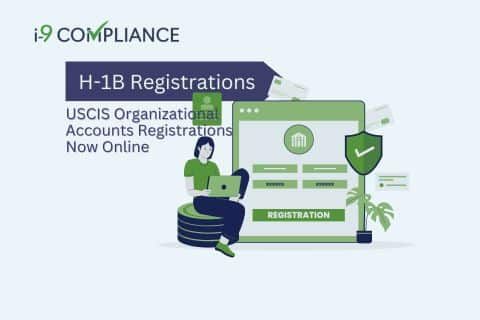USCIS Organizational Accounts for H-1B Registrations Now Online

The U.S. Citizenship and Immigration Services (USCIS) recently introduced new organizational accounts in time for the fiscal year 2025 H-1B cap season. According to the USCIS, these accounts are part of an upgraded platform that boosts collaboration and improves the process for employers and workers.
The H-1B initial registration period began on March 6, 2024. As such, employers must create a new organizational account to register for the H-1B cap lottery or upgrade their existing accounts. These accounts allow multiple individuals, both within an organization and outside, to collaborate on H-1B registrations on behalf of their selected candidates.
Employers must select an administrator to create the new organizational account platform. This administrator will oversee the “Company Group” and allow several people to work together when preparing initial H-1B registrations for selected individuals. In addition, the administrator can make payments and submit official registrations on the employer’s behalf.
After creating the Company Group, an administrator can invite others to act as administrators or “members.” An administrator has several added powers over a member, so they must carefully consider who should have which role in the account. A member does not have the power to alter or delete an H-1B registration, making it a safer choice for employees with limited roles in the process.
Administrators may also invite legal representation to create H-1B registrations on their behalf. In some cases, legal representation can also initiate a company group. As such, they could assign new administrators to assist in managing the company group.
After creating a company group and assigning the roles, the initial registration process for the H-1B visa will appear largely unchanged. For employers not interested in using the account’s collaboration features, keeping one person in a company group remains possible. Furthermore, the USCIS’s new system requires employers to respond to a Request for Evidence (RFE) or Notice of Intent to Deny (NOID) online.
Employers intending to file an H-1B registration should review the process to familiarize themselves with these changes. They should also work quickly to submit their registration within the filing window.
It is also crucial to consider other potential compliance issues, such as the employment eligibility verification (Form I-9) process. Many employers have encountered several challenges with this process, particularly for certain foreign national workers. One way to stay updated on this process is to use electronic I-9 management tools. These tools can guide organizations through every stage while providing convenient digital access and reminders.
Learn more about automating your employment eligibility verification and ensuring compliance with I-9Compliance.